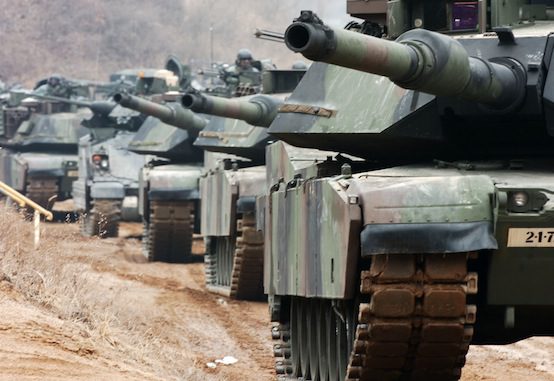How to Build a National Defense We Can Afford

Earlier this month, two foreign-policy experts warned the president that he must transform his strategy for defeating the Islamic State or risk empowering Iran. “We’ve tried the hands-off, no-boots-on-the-ground approach for six years,” they wrote, “and it has brought us to this unacceptable dilemma.” If the president adopted this advice, however, he would not only fail to solve the dilemma, but also continue the deterioration of America’s conventional military power and place our national security at greater risk.
The aforementioned essay—“America’s Way Ahead in Syria,” published via the Institute for the Study of War—proposes a strategy in which the U.S., along with “willing and acceptable partners, seizes and secures a base of operations in southeastern Syria to expand American freedom of action in the region and build a new Syrian Sunni Arab partner by, with, and through which to conduct a population-centric counterinsurgency to destroy ISIS and al Qaeda, set conditions to prevent their reconstitution, and eventually resettle refugees.”
Such an aggressive expansion of military power would heft enormous strategic risk on America’s back with virtually no chance of improving our security.
First, setting up a military base on the soil of a sovereign state—even one controlled by a regime as hated as Assad’s—is an overt act of war, which would be a violation of international law. Equally troubling, such a move would substantially increase the possibility of a direct military clash with Russia, Iran, and Syria. No interest on the ground in Syria is worth such risks.
The proposed strategy wrongly assumes that the United States has the obligation to police the Middle East, Asia, Europe, and selected parts of Africa. Adherents to this way of thinking believe they are justified in enforcing the outcomes of their choosing using armed drones, airstrikes, special-operations missions, military assistance to preferred customers, or in some cases the full might of the U.S. military.
Not only are these views antithetical to traditional American values, but this policy would fail to accomplish its direct objectives—and more important, it would deplete our national treasure, pointlessly sacrifice the blood of our citizens abroad, and endanger all U.S. citizens by creating enemies where they might otherwise not exist.
The United States is currently struggling under the weight of an unprecedented and growing national debt of $20 trillion. It is clear that the debt must be reduced or the weight of it may one day come crashing down on a U.S. economy that cannot sustain it.
Yet for all the cuts recommended by the White House, the size of the federal budget didn’t decrease, because of offsetting increases in Pentagon and “hard power” spending.
One of the main reasons military leaders say they need a bigger defense budget is that the pace and “optempo” of missions abroad are stretching the forces to the breaking point. It is time for a new discussion—one that examines our foreign-policy strategy with fresh eyes.
During my 21 years in the U.S. Army, I served in Germany, Korea, Iraq, and Afghanistan, and I saw combat ranging from high-intensity armored fighting to a military trainer, and finally in traditional counterinsurgency battles. I can tell you without equivocation that America’s current foreign policy of intervening around the globe in places that aren’t vital to our national-security interests is doing far more harm to America’s national security than any other single factor.
Russia, China, and even North Korea are modernizing their conventional forces and making them more lethal, strengthening their anti-air defenses, and expanding their reach into space. The United States, on the other hand, continues to see its military edge decline. Without immediate and substantive changes, we will further erode our advantage.
The administration and Congress should make a long-overdue change in foreign policy that not only eschews “nation building” and “regime change” in the main, but also recognizes the losing strategy of using the U.S. military to try and solve internal political conflicts around the world.
Relieved of the burden of fighting perpetual battles to tilt the scales in civil wars in foreign lands, the U.S. Armed Forces could spend far less in operations, refocus their training and attention on preparing for genuinely existential threats, and once again restore the powerful deterrent that ensures the security of the nation.
The mentality of persistently employing lethal military power abroad has proven to be a bankrupt way of thinking. If not altered, it will soon cripple us financially, perhaps fatally weakening our national defense in the process. The time has come to jettison these failed policies and adopt a new way of thinking that restores military strength and protects our financial solvency. American citizens can only enjoy a strong national defense if we maintain a vibrant and prosperous economy.
Daniel L. Davis is a senior fellow for Defense Priorities and a former lieutenant colonel in the U.S. Army who retired in 2015 after 21 years, including four combat deployments.